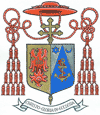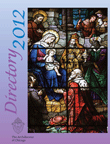
The Cardinal's Column
Francis Cardinal George, O.M.I.
‘In Truth, Peace:’ What is happening in Iraq?
Cardinal George's Schedule
- January 8: 11 a.m., 75th Anniversary Mass at St. Vincent Ferrer Parish, River Forest
- January 9: 10 a.m., Episcopal Council Meeting, Residence
- January 10: 7:30 a.m., Department Directors Mass and Breakfast, Residence
- January 12: 9 a.m., Council of Religious Leaders of Metropolitan Chicago Retreat, Presbytery of Chicago, 100 S. Morgan St., Chicago; 4 p.m., Address Seminary Community, Mundelein
- January 14-21: International Committee on English in the Liturgy (ICEL) meeting, Auckland, New Zealand

Cardinal's Appointments
His Eminence, Francis Cardinal George announces the following appointments:
Administrator
Rev. Edward C. Doherty, OSA, to be the administrator of St. Rita of Cascia Parish, South Fairfield, effective Jan. 1.
Sabbatical
Rev. James F. Blazek, from pastor of Immaculate Heart of Mary Parish, North Christiana, to be on sabbatical from Jan. 1 to June 30.
Rev. Terrence McCarthy, to be on sabbatical from Jan. 1 to June 30.
Pope Benedict XVI’s message for the annual January 1 World Day of Peace this year connects peace and truth. The Pope is a teacher, always concerned about telling the truth. The message for 2006 reminds the world of the old saying that the first casualty in any conflict is truth. The Pope says it more carefully by recalling the Beatitudes, which call us to be peacemakers, and explaining again the choice of his name as Pope: Benedict. “I wanted to evoke both the Patron Saint of Europe, who inspired a civilization of peace on the whole continent, and Pope Benedict XV, who condemned the First World War as a ‘useless slaughter’ and worked for a universal acknowledgement of the lofty demands of peace.”
The Pope says in his message, “… wherever and whenever men and women are enlightened by the splendor of truth, they naturally set out on the path of peace.” He asks about obstacles to our being enlightened by the truth of peace and mentions some. First, he mentions the “father of lies” who led our first parents into sin at the beginning of human history. Pope Benedict points out how lies continue in “aberrant ideological and political systems” which twisted the truth in the last century and brought about the exploitation and murder of an appalling number of men and women, of entire families and communities. Second, he mentions terrorism, which stems either from nihilism that denies the very existence of truth or from fanatical fundamentalism that tries to impose truth by force. Both causes of terrorism show a dangerous contempt for human beings and human life and ultimately for God himself. “Nihilism denies God’s existence and his provident presence in history, while fanatical fundamentalism disfigures his loving and merciful countenance.”
The Holy Father speaks about nuclear disarmament and the search for an international order respectful of cultural and national differences. He notes signs of hope in peace negotiations, especially in the Holy Land. He encourages those in military service to contribute to the establishment of peace and tells military chaplains to be “faithful heralds of the truth of peace.” He supports the United Nations organization as an instrument of human solidarity, even as he calls for its renewal in order to respond to the challenges of globalization. He asks for prayers for peace as a gift from God and for honesty in human political discussions. “The foundations of authentic peace rest on the truth about God and man.”
The Pope’s message makes no explicit mention of the conflict that most disturbs the peace of this country at the beginning of 2006: the war in Iraq. I’m not sure why a message on the connection between truth and peace does not discuss a war that many have come to believe was entered into based on inaccurate information. Quite apart from any judgment about the value of the factual information given to justify attacking Iraq, the Holy See objected that a pre-emptive strike against a country not actually invading another country does not fit easily into the “just war theory” the Church uses to make moral judgments about war and peace. The Holy See therefore, while recognizing that the former Iraqi regime threatened peace, insistently cautioned the United States against invading Iraq. The U.S. bishops spoke in similar, if somewhat less insistent terms before the attack began. Once the war began, however, both the Holy See and the U.S. bishops have said that our country is not free simply to withdraw from Iraq and leave chaos behind. Even an arguably immoral invasion brings moral responsibilities to the invader.
What are the truths that lead the U.S. bishops to turn from the argument that our very presence causes conflicts we cannot solve? I doubt that any account can give a totally accurate picture of a country torn by war, but I want only to tell a few truths here about the condition of Christians in Iraq. Their situation is not often mentioned in reports about the war, yet it should influence the judgment of those of us who share their faith. Bishops in one country listen to bishops from another, and the Catholic bishops of Iraq are worried about the fate and the future of the people in their care.
The Christian population of Iraq represents only three percent of the country’s estimated 26 million inhabitants. The great majority of these Christians are members of the Chaldean Catholic Church, the oldest of the Eastern Churches in communion with the Holy See. Other Christians are Orthodox and some are Protestant. Though the Muslim majority generally tolerates them, for the Islamic extremists they are infidels and collaborators of “the invading army of crusaders.” There are strong pressures to convert to Islam. This campaign against Christians has been spearheaded by a group that calls itself “The Brigade to Eliminate Christian Agents and Spies.”
Christian students at Iraqi universities seem to be a particular target. Fifteen hundred Christians at one large university have decided to interrupt their studies after receiving death threats by an Islamic group that has taken over the university. Christian women are under constant pressure to wear the burka. Christian shopkeepers who had been permitted to sell alcohol have been forced to close their shops. Christian hairdressers have lost their businesses because some interpret Muslim law to forbid the cutting of hair.
All of this has devastating effect on the day to day life of Christians. Last Christmas, most Chaldean churches cancelled Midnight Mass because large Christian gatherings attract perpetrators of violence. Some Church buildings have been attacked, with loss of life. In the elections, though there were no less than eight Christian parties running candidates, few Christians were able to vote. Most Christians are in the Sunni provinces and, for reasons of security, fewer polling booths seem to have been provided there.
Some of these attacks on Iraqi Christians have been provoked by a virtual invasion of Christian fundamentalists from the United States. They have little impact upon Muslims, except to enrage them; but they make inroads among dispirited Iraqi Christians, often worn down by the hardships of their situation. Press bulletins from the communications office of the Chaldean Church have denounced the attacks on Chaldean Catholics: “These hateful crimes not only lead to the loss of innocent life but, by targeting the breadwinners, they have put Chaldean families in an extremely difficult situation so that in a number of cases the Church is struggling to assure them a livelihood.”
The regime of Saddam Hussein had worked out a “modus vivendi” in Iraq which both harassed Christians (and others) and simultaneously supported their institutions, including Catholic schools. In recent years, many Christians have been expelled from the northern provinces. Many others have left the country for Syria and Jordan. As their plight grows more desperate, more Christians have been seeking refuge in the West, especially in the United States, in Canada and Australia. More than 40,000 Christians have had to leave Iraq in recent years.
I write this simply to bring to our attention truths that seldom or never enter into public discussion here. These facts should not diminish in any way our respect and esteem for Muslims living in our own country. The persecutors of Iraqi Christians are living in Iraq, not here. Any contempt for or threat to Muslims in our neighborhoods makes us the moral equivalent of those who harass Christians in Iraq. We all have the right, however, to ask that our own government use whatever influence it can bring to bear in Iraq to be sure that Iraqi Christians should not have to leave their own country to practice their religion or to preserve their goods and lives.
As we pray for peace at the beginning of this New Year, keep in mind the Christians of Iraq. Pray for the protection of our service men and women, and pray that the Iraqi peoples will be able to establish a civil society based upon truth and mutual respect for all Iraqis. God bless you.
Sincerely yours in Christ,
Francis Cardinal George, OMI
Archbishop of Chicago



